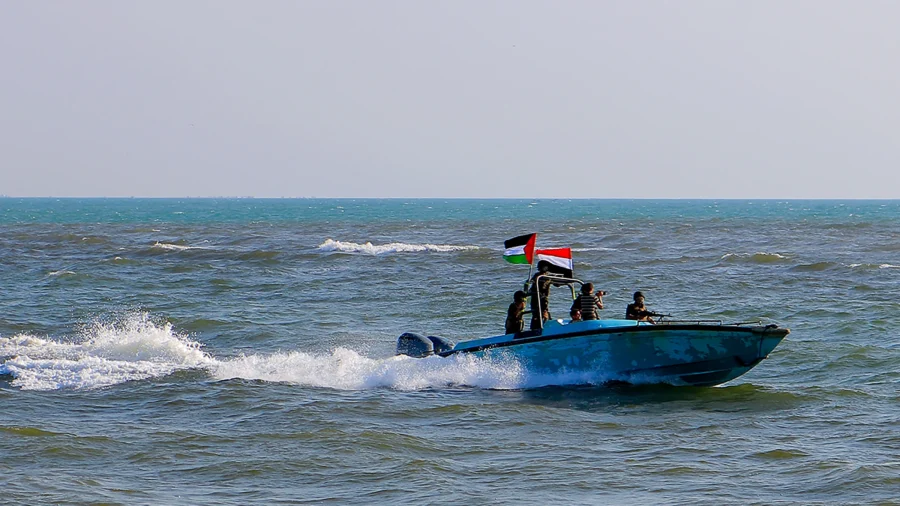The Houthi terrorist group in Yemen severely damaged a Liberian-flagged cargo ship on Wednesday using an explosive-laden drone boat, also known as an unmanned surface vessel (USV).
A spokesperson for the Houthis announced in a press statement that the Houthis remotely drove an explosive-laden boat into the Liberian-flagged bulk carrier M/V Tutor on June 12, inflicting “severe damage to the ship.”
The U.S Central Command (CENTCOM), which oversees military operations in the Middle East, also confirmed the Tutor was damaged in an apparent USV attack.
CENTCOM reported it had intercepted multiple Houthi-launched ballistic and cruise missiles over the Red Sea on Wednesday but failed to stop the terror group’s explosive boat from striking the Tutor.
“The impact of the USV caused severe flooding and damage to the engine room,” CENTCOM said in a Wednesday press statement.
The United Kingdom Maritime Trade Operations (UKMTO) office, a maritime monitoring component affiliated with the British Navy, also shared a bulletin describing the attack.
UKMTO reported a commercial vessel transiting the Red Sea was struck by a “small craft” measuring five to seven meters in length at around 10:14 a.m. Yemen time. UKMTO reported that the master of the commercial vessel reported the ship had begun to take on water and was no longer under the control of the ship’s crew as of 5 p.m. Yemen time.
The Houthis have damaged and sunk other commercial vessels in recent months as they’ve launched missiles and airborne explosive drones targeting ships transiting the Red Sea waterways. This latest attack, however, appears to be the first time the Houthis have successfully used a drone boat to damage a target vessel in this recent pattern of attack.
The Houthi attacks on commercial shipping began last fall as a response to the Israeli military campaign in the Gaza Strip against Hamas, another terrorist group. The Yemeni Houthis have claimed the attacks are targeting vessels affiliated with Israel and demonstrate a measure of support for Gaza’s Palestinian population and that they will continue until the Gaza conflict ends.
“The Yemeni Armed Forces affirm their commitment to continue their military operations in support of the Palestinian people’s plight and in response to the American-British aggression against our country until the aggression ceases and the siege is lifted on the people of Gaza,” the Houthi spokesperson said following the Wednesday attack on the Tutor.
The United States maintains that the Houthis are aligned with the government of Iran and are receiving Iranian military assistance.
The United States and other partner nations and organizations have warned that the continued attacks on the Red Sea waterways threaten global shipping and risk further destabilization in the Middle East.
The U.S. military has led efforts, both unilaterally and in coordination with other allies and partners, to intercept the Houthi attacks and strike launch sites, weapons caches, and other military targets. On May 30, British and American forces conducted a wave of strikes targeting 13 suspected Houthi sites throughout Yemen.
The U.S. government, under different presidential administrations, has removed and re-designated the Houthis from its terrorist list.
The Houthis fought with the internationally-recognized Yemeni government throughout the 2000s and 2010s before eventually seizing control of the country’s capital city, Sana’a, in 2014.
By 2015, President Barack Obama’s administration had begun to provide U.S. military logistical and targeting support for a Saudi Arabian-led military coalition supporting the internationally-recognized Yemeni government in their fight against the Houthis. The Obama administration did not designate the Houthis as a terrorist group, even as it supported the other side in the Yemeni civil war.
President Donald Trump’s administration continued U.S. support for the Saudi-led counter-Houthi coalition throughout his presidency and moved to designate the Houthis as a specially designated global terrorist group and as a foreign terrorist organization in his final days in office. President Joe Biden’s administration reversed the terror designations within days of taking office.
In January, the Biden administration put the Houthis back on the specially designated global terrorist group list in January as the group escalated attacks in the Red Sea. At the time, Secretary of State Antony Blinken said the United States “will reevaluate this designation” if the attacks stopped.

